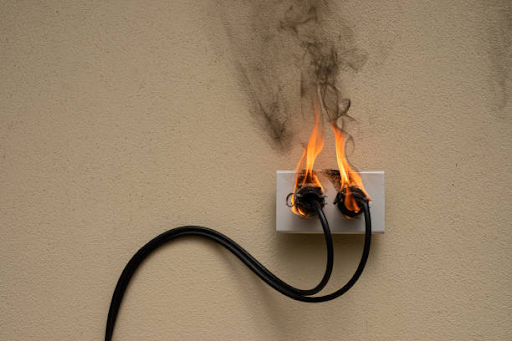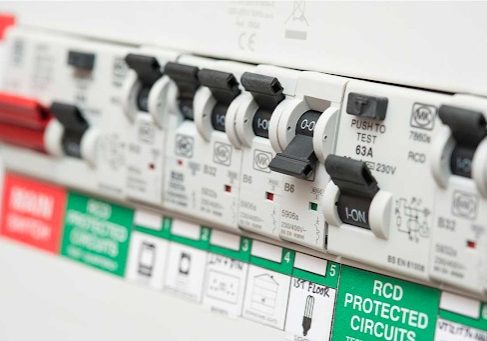Electrical safety is a paramount concern for every household, and the circuit breaker plays a pivotal role in safeguarding your home from electrical hazards. Designed to halt the flow of electricity when irregularities are detected automatically, the circuit breaker is your first defence against potential electrical fires and other dangers.
However, when a circuit breaker frequently trips, it’s not just an inconvenience; it’s a signal that something may be amiss in your electrical system. This article delves into the common reasons behind a tripping circuit breaker and offers practical solutions.
Common Reasons for Circuit Breaker Tripping
1. Overloaded Circuit
An overloaded circuit occurs when the electrical demand on a circuit exceeds its capacity. This is often caused by having too many appliances or high-power devices connected to a single circuit. To resolve this, you can either redistribute the electrical load or consult an electrician to install additional circuits.
2. Short Circuit
A short circuit is a more serious issue when an active or “hot” wire comes into contact with a neutral or hot wire. This can result in immediate circuit breaker tripping and may even cause electrical fires if not addressed promptly.
3. Earth Fault
Like a short circuit, an earth fault occurs when a hot wire comes into contact with a grounded object, like the metal box housing the circuit panel. This can be a severe hazard and requires immediate attention.
4. Appliance Malfunction
Faulty or damaged appliances can draw more power than they should, causing the circuit to overload. Always check the condition of your appliances if you experience frequent tripping.

5. External Factors
Weather conditions like lightning storms can also cause circuit breakers to trip. While this is usually temporary, it’s advisable to consult an electrician if the problem persists.
6. Inadequate Wire Size
Sometimes, the wiring in your home may not be sufficient to handle the electrical load, especially in older homes. Inadequate wire size can cause overheating and eventually lead to a tripped circuit breaker.
7. Ageing Circuit Breaker
Circuit breakers don’t last forever. An old or worn-out circuit breaker may become sensitive and trip more easily, even without apparent reason. If your circuit breaker is more than 15-20 years old, consider replacing it.
8. Electrical Inrush
Some appliances, known as inrush current, draw more current when they start up. This sudden surge can sometimes be enough to trip the circuit breaker, even if the circuit isn’t overloaded.
9. Poor Quality or Damaged Electrical Components
Substandard or damaged electrical components like outlets, switches, or even the circuit breaker itself can be a reason for frequent tripping. Always opt for high-quality components that meet Australian standards.
10. Fluctuations in Electrical Supply
Sometimes, the issue might not be within your home but with the electrical supply from the grid. Fluctuations or spikes in the electrical supply can cause your circuit breaker to trip as a precautionary measure.
Preventive Measures
Limit Appliance Usage: Avoid using high-power-consuming appliances like air conditioners and fridges simultaneously on the same circuit.
Regular Inspection: Have an electrician inspect your home’s electrical system regularly to identify and fix any worn or damaged wires.
Upgrade Your System: Older homes may require an electrical system upgrade to handle the electrical load of modern appliances.
The Cost of Ignoring a Tripping Circuit Breaker
Ignoring a frequently tripping circuit breaker may seem like a minor inconvenience, but it can lead to significant financial and safety risks that should not be underestimated.
Here’s why:
Increased Electricity Bills: A malfunctioning circuit breaker can result in inefficient energy usage, leading to higher electricity bills. The constant tripping could indicate that your electrical system is working harder than it should, consuming more energy.
Cost of Repairs: If you ignore the issue for too long, you may end up with a damaged electrical system that requires extensive and costly repairs. This could include rewiring your home or replacing electrical panels, both expensive undertakings.
Appliance Damage: Frequent power interruptions can harm your electrical appliances and devices, reducing lifespan and efficiency. This means you’ll have to replace them sooner, incurring additional costs.
Safety Risks
Electrical Fires: One of the most severe consequences of a faulty circuit breaker is the risk of an electrical fire. If the circuit breaker fails to trip when it should, an electrical overload can heat the wires and potentially ignite a fire.
Electrocution Hazards: A malfunctioning circuit breaker may not protect you from electrical shocks. This poses a serious risk, especially in homes with children or pets who might accidentally come into contact with exposed wiring.
Compliance with Regulations: Western Australia has specific rules for electrical connections, including a recent update that standardised the connection service capacity to 63 amps for small-use, single-phase connections throughout the South West Interconnected System. Non-compliance with such regulations can lead to penalties.
Reimbursement Program: There is a reimbursement program for customers who were required to install a 32A breaker and are experiencing frequent tripping, allowing them to claim costs for upgrading to a 63A breaker. This underscores the need to stay informed about electrical regulations that can affect your property and finances.
Given these risks, promptly addressing a tripping circuit breaker is crucial. Consult a qualified electrician to diagnose and resolve the issue, ensuring your home’s electrical system is efficient and safe.
Contact Volt Air for Specialised Electrical Services
Are you facing persistent issues with your circuit breaker? While some issues can be resolved through simple adjustments, others may require professional intervention. When in doubt, always consult a qualified electrician to ensure the safety of your home’s electrical system.
Volt Air is here to help. Our team of fully qualified and licensed electricians are ready to assist you with all your electrical needs, from switchboard repairs to complete electrical installations. Contact us to discuss further.
